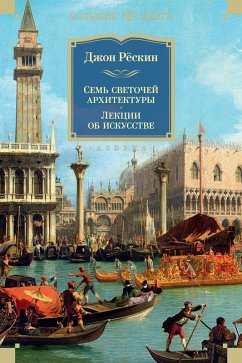
The Stones of Venice (Vol. 1-3) (eBook, ePUB)
Enriched edition. Study of Venetian Architecture
Kommentar: Pemberton, Clarissa / Redaktion: Good Press

PAYBACK Punkte
0 °P sammeln!
In "The Stones of Venice," John Ruskin offers a profound exploration of architecture, art, and the moral underpinnings of society. This multi-volume work deftly combines vivid descriptions, detailed analyses, and historical insights, delving deep into the construction and aesthetics of Venetian architecture as a reflection of cultural values. Ruskin employs an evocative literary style rich in metaphor and symbolism, illuminating how the intricate details of buildings inspire both moral contemplation and societal critique. Its context emerges from the Victorian era's fascination with art and hi...
In "The Stones of Venice," John Ruskin offers a profound exploration of architecture, art, and the moral underpinnings of society. This multi-volume work deftly combines vivid descriptions, detailed analyses, and historical insights, delving deep into the construction and aesthetics of Venetian architecture as a reflection of cultural values. Ruskin employs an evocative literary style rich in metaphor and symbolism, illuminating how the intricate details of buildings inspire both moral contemplation and societal critique. Its context emerges from the Victorian era's fascination with art and history, against the backdrop of burgeoning industrialization that threatened traditional craftsmanship. John Ruskin, a pivotal figure in the Victorian art movement, was an ardent advocate for craftsmanship and the beauty of nature, deeply influenced by his environmental convictions and a reverence for medieval artistry. His extensive travels in Europe, particularly his admiration for Venice, fueled his belief that architecture is a moral and philosophical reflection of its time. Ruskin's commitment to social reform and his concern for the decline of artisan craftsmanship are evident throughout this work, as he seeks to reconnect art with ethical living. Readers seeking a rich, interdisciplinary examination of architecture and its role in society will find "The Stones of Venice" an indispensable tome. Ruskin's eloquence and passionate advocacy for aesthetic and moral values resonate with contemporary issues in art and culture, making this seminal work a critical read for anyone interested in the intersections of art history, philosophy, and social criticism. In this enriched edition, we have carefully created added value for your reading experience: - A succinct Introduction situates the work's timeless appeal and themes. - The Synopsis outlines the central plot, highlighting key developments without spoiling critical twists. - A detailed Historical Context immerses you in the era's events and influences that shaped the writing. - An Author Biography reveals milestones in the author's life, illuminating the personal insights behind the text. - A thorough Analysis dissects symbols, motifs, and character arcs to unearth underlying meanings. - Reflection questions prompt you to engage personally with the work's messages, connecting them to modern life. - Hand-picked Memorable Quotes shine a spotlight on moments of literary brilliance. - Interactive footnotes clarify unusual references, historical allusions, and archaic phrases for an effortless, more informed read.
Dieser Download kann aus rechtlichen Gründen nur mit Rechnungsadresse in A, B, BG, CY, CZ, D, DK, EW, E, FIN, F, GR, H, IRL, I, LT, L, LR, M, NL, PL, P, R, S, SLO, SK ausgeliefert werden.






![Stones of Venice [introductions] (eBook, ePUB) Cover Stones of Venice [introductions] (eBook, ePUB)](https://bilder.buecher.de/produkte/58/58499/58499730n.jpg)






